Here we are: one month into the semester. The work is starting to pile up, and professors are giving mention to looming midterms. It’s not too late to take charge of your study habits, and note-taking plays a big role in that.
Use one notebook per course.
Keep your notes for each class together by using separate notebooks. If you must use the same one for all of your courses, make sure it is a multiple-subject notebook, or use a binder, loose-leaf paper, and dividers to keep your notes from history and French from getting cross-contaminated.
Read the text before class.
If you want to keep up in class discussions, you should always come prepared, but doing the reading also helps with note-taking. You can focus your notes on the part of the textbook you didn’t understand and ignore what came naturally to you. And voilà! Your notes instantly become a personalized supplementary study guide.
Don’t use your computer.

Topshelf Records / YouTube
Sure, typing is easier and faster (and who even remembers how to write in cursive anyway?), but it’s also a bad habit for note-taking. Terrible, actually. During my freshman year, I lugged my computer to my Art History 101 class and took vague, unfocused notes, often doing no more than copying an image of the artwork from Google and pasting it into Microsoft Word. If I was feeling dedicated, I’d add some phrases my professor would say: “elongated figures… earthy color palette…” After half an hour or so, I’d open ModCloth in another tab and curate my wish list. Was it fun? Totally—I love online shopping. Was it productive? Maybe for my wardrobe, but not for my studying. If you just transcribe what you hear your professor say, you aren’t doing much thinking. When you take notes by hand, you actually have to interact with the material. Plus, it’ll be easier to stay focused and off Twitter if you don’t have your computer in front of you.
Listen, then write.
You probably can’t write as quickly as your professor speaks (no, that’s not a challenge), and so it isn’t time-efficient to try. Even if you could write things down verbatim that quickly, you wouldn’t be synthesizing any information. Listen to your professor first and foremost. What is he or she really saying? What is the main point? That’s what you want to write down.

Power Rangers / Giphy
Use shorthand.
You have less to write if you only jot down the main points, but it still might take a while. Take basic symbols and abbreviations (e.g., i.e., &, $, @, #, etc.), and develop your own system of shorthand.
!!! INDICATE WHAT IS IMPORTANT !!!
^^ That got your attention, didn’t it? If your professor takes the time to write something out on the board, dance around a PowerPoint slide with the laser pointer, or say, “This will be on the test,” you can bet it’s important. Add stars, asterisks, exclamation marks, underlines, capital letters, or highlights.
Color-code.
Taking great notes is about organizational skills, and I know of no one better at organizing than Leslie Knope, protagonist of Parks and Rec. She color-codes her binders to keep everything easy to understand. Plus, the colors make things prettier.
Write in pen.
Pencil lead smears as soon as you turn to the next page in your notebook. If you’re left-handed, you probably even smudge it as you write. Fast-drying pen has its perks. Your notes look and stay cleaner. And if you mess up, you aren’t tempted to erase, which can be time-consuming. Strike a line through the wrong information and start anew. No eraser needed.
Leave room to add more to your notes.
Double-space your notes as if you were double-spacing a research paper. Write on every other line of the paper so that you can add information there or in the margins later.
Write directly in the book.
This is one of the most controversial pieces of advice I’ll ever give, but hear me out. I was an English major, and I wrote scores of essays during my college career. Seriously. I only took two tests; every other final or midterm was an essay. Often, I’d have to compare two works or make an argument about a book, using the text as evidence. There was no better way to prepare for these assignments, or interact with the text in general, than by taking my pen and marking up my book. When it came time for a class discussion, I could open my book, find my note, raise my hand, and ask the class to turn to page 156 and help me understand the third paragraph. I should note that I never sold my books back. They were usually paperbacks, not textbooks, and I knew I’d keep them on my bookshelf long after I graduated college. If you take an English class (or major in it!), you might decide to take your notes directly in your book.
- Consider requesting assistance if you have a disability. Some students who have learning or physical disabilities may prefer assistance when it comes to taking notes. Your school’s disability office can accommodate you if you register your situation at the beginning of the semester. It may provide special technology, an interpreter, or a transcriptionist. Don’t be afraid to ask your school for the help you need.

The Office / Giphy
Set up a buddy system.
Your notes are for you, and you’ll get the most out of them if you take them yourself. (I, for one, would be impressed if anyone else could even read my handwriting.) Still, when it comes time to study, you might benefit from seeing the information in a new way. Trade copies of your notes with friends. They may have jotted down something you missed. Who knows. You might also pick up some note-taking tips that can help you make yours better next semester.
Review your notes before the next class.
What good are your notes if you don’t use them? Read over them often (actually, what are you doing right now?), not just right before the final.
-
What Is Test Anxiety and How Do You Cope with It?
-
Eight Ways to Lessen Stress and Fatigue while Studying
-
How to Maintain a School-Life Balance
-
Deciding Whether or Not You Should Drop a Class
-
Everything You Need to Know about the GMAT
-
Four Ways for Students to Adjust to Daylight Saving Time
-
Grupos de estudios: ¿sí o no?
-
Everything You Need to Know about the MCAT
-
How to Make Your Schedule Wisely Using Rate My Professors
-
Libros y revistas en inglés para estudiantes de cada nivel
-
How to Succeed in Your Summer Classes
-
Eight Study Tips to Help You Ace the SAT


